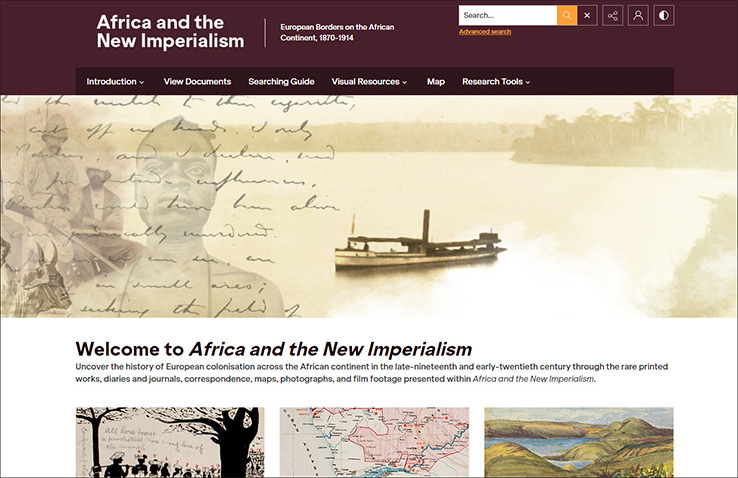Africa and the New Imperialism: European Borders on the African Continent, 1870–1914 | eReview
AM’s database Africa and the New Imperialism covers the history of European colonial expansion in Africa during the late 19th and early 20th centuries. It’s a valuable addition for institutions seeking to expand their collection of primary source offerings on African history and European colonialism during this time period.
Africa and the New Imperialism: European Borders on the African Content, 1870–1914
CONTENT AM’s Africa and the New Imperialism: European Borders on the African Continent, 1870–1914 covers the history of European colonial expansion in Africa during the late 19th and early 20th centuries. It provides access to primary source materials that document the rise of imperialism across the continent and its impact on the people of Africa. With documents ranging from diaries and journals to correspondence, reports, images, British Foreign Office files, and more, the collection covers themes such as enslavement, race, violence, religion, resistance, and beyond, sourced from libraries such as the Archives Nationales d’Outre-Mer, the Bodleian Library, the British Film Institute, the Sanford Museum of Florida, and several other renowned libraries and archives. The collection is tagged with a series of regions: Central Africa, East Africa, Horn of Africa, North Africa, Southern Africa, West Africa, and “Rest of the World.” It also includes a variety of teaching tools to support scholarship and curriculum development, such as essays, maps, a visual gallery, biographies, informational pieces written by subject experts and AM’s editorial team, and guides to regions, places, and archival collections featured in the resource.
USABILITY The database is organized into six sections: an introduction to the collection, a browsable part for accessing documents, a search guide, a menu to locate visual resources, an interactive map, and research tools. The “View Documents” and “Visual Resources” menus are the two most browsable points of access for materials in the collection and allow users to peruse all documents. In the case of visual resources, users can search by type and filter by date, region, document type, language, and/or library/archive.
Search functions include basic and advanced tools. With the option to combine queries and add rows, the advanced-search feature offers filters for looking by date or within a date range and limiting by one or more of the seven defined regions, 30 document types, 18 languages, and/or 11 libraries and archives that contribute to the collection.
Results are sorted by relevance but can also be organized by title and date. Users can find details such as document title and type, date, region, language, archive, and thumbnails of the images associated with the work. Both titles and images can be bookmarked and saved for later review. When conducting searches, additional results are presented through links to individual images and/or pages within the selected document. Search terms are also highlighted in the document’s transcript. Sharing options are limited to email, Twitter, and Facebook links and can be accessed via a “share” button.
PRICING Cost is determined by a range of factors that influence the size of the potential user group, including but not limited to Carnegie Classification and full-time enrollment. Contact info@amdigital.co.uk for more about pricing.
VERDICT While better placement would improve the sharing options, the database is easy to search and browse, with the list of categories, regions, and languages enhancing users’ ability to refine their research strategy and engage in targeted searching. AM’s focus on a well-defined slice of African history makes this resource a valuable addition for institutions seeking to expand their collection of primary source offerings on African history and European colonialism in the late 19th and early 20th centuries.
Add Comment :-
RELATED
ALREADY A SUBSCRIBER? LOG IN
We are currently offering this content for free. Sign up now to activate your personal profile, where you can save articles for future viewing









